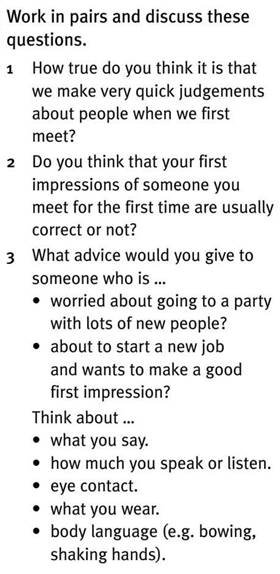"Reading+Speaking", Upper-Intermediate, частина 1
LESSON PLAN
COVER PAGE
|
Lesson Focus: Reading+Speaking |
Length: 45 min |
Upper- Intermediate |
|
Lesson Aim
By the end of the lesson, students will have improved at reading for gist and for detailed understanding in the context of talking about meeting new people. Practice speaking for fluency
Subsidiary Aim To introduce and clarify selected vocabulary from the text
|
|
Materials
Handout 1 and 2 ©Taken from New Total English Upper-Intermediate Student’s Book by Araminta Grace with Richard Acklam, 2011, Pearson Longman, p.8
Handout 3 ©Adapted from New Total English Upper-Intermediate Student’s Book by Araminta Grace with Richard Acklam, 2011, Pearson Longman, p.8
|
|
Time |
Interact ion |
Stage & Aim |
Procedure |
|
5 min |
T-Ss
S-S
T-Ss |
1 Lead-in To engage the students in the context of the lesson. |
Ask the students about their social life. Put students in pairs. Ask them to discuss questions: “How often do you meet new people?” “What kind of things do usually talk about when meeting someone for the first time?” “Is it easy for you to be the first to start a conversation? Why/Why not?”
Conduct an open class. Nominate students to answer. |
|
7 min |
T-Ss
S
S-S
T-Ss |
2 Reading for gist / skimming To read the text quickly for a general comprehension. |
Tell students they are going to read “Any Answers” website. Chest Handout 1, tell them to read quickly and to find the answer to the question “How does each person feel about meeting new people?” Set the time limit of 2 minutes. Give Handout 1.
Put students in pairs. Ask them to check in pairs. “Turn to your partner and talk about your answers. You have 2 minutes.”
Conduct an open class content feedback. |
|
4 min |
T-Ss
|
3 Pre-teach blocking vocabulary To unblock words necessary to understand the text and |
Elicit meaning of the words asking questions: “What verb do we use to tell that we to speak quietly and in a way that is not clear so that the words are difficult to understand?” Mumble “What do we call someone who tends to form opinions too quickly, |
|
|
|
complete the tasks. |
especially when disapproving of someone or something?” - Judgmental “What do we call an impression we get immediately, without any delay?” - instant opinion “What do we call feelings or actions that we are not completely aware of” - unconscious “What is the word for something stupid or unreasonable and deserving to be laughed at?” - ridiculous “What verb do we use to tell that we behave towards someone or deal with something in a particular way?” - to treat “What phrase do we use to describe the action when we persuade someone that he or she is wrong or should not act?” - To talk down “What is the word for conversation or reports about other people’s private lives that might be unkind, disapproving, or not true?” - To gossip “What verb do we use to say that someone speaks too proudly or happily about what he has done or what he owns?” - To boast Write them on the board. |
|
10 min |
T-Ss
S
S-S
|
4 Reading for detailed understanding To read the text for deeper comprehension. |
Chest Handout 2. Set the reading task: “You are going to read the website again and answer the question. You will have 3 minutes”. Give Handout 2
Put students in pairs. Ask them to check in pairs. “Turn to your partner and talk about your answers. You have 3 minutes.” |
|
|
T-Ss |
|
Conduct an open class feedback on content. Gather material for DEC |
|
12 min |
T-Ss
S
S-S
|
5 Productive followup: speaking
To provide the students with a chance to respond to the text. To personalize the text. To practice speaking for fluency. |
Set the task. Chest Handout 3. Ask students to answer question and complete the HO with information about themselves: “You will have 3 minutes to write your answer in the second column.” Give Handout 3
Set pairs and ask students to share information about each other: “Now turn to your partner and ask each other question to find out if you have anything in common” Model first question. Give students 4 minutes. When they finishes – change pairs, repeat the activity. |
|
7 min |
T-Ss
S
S-S
T-Ss |
6 Content feedback To upgrade students’ language accuracy |
Draw students’ attention. Stop activity. Ask a few students to share information about each other.
Delayed error correction. Write some mistakes on the board. Ask students to think about the mistakes individually. Give them 2 minutes Set pairs and ask students to share their ideas with each other.
Elicit and correct the written mistakes. |
Handout 1

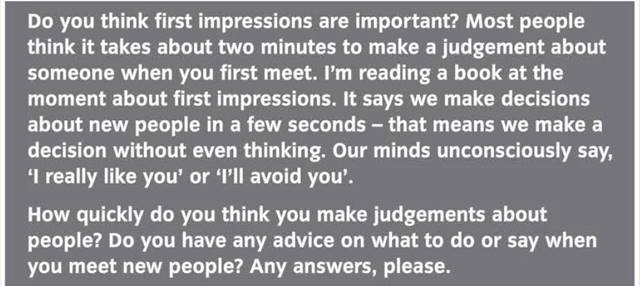
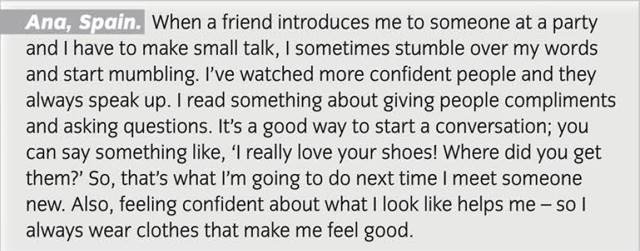
©Taken from New Total English Upper-Intermediate Student’s Book by
Araminta Grace with Richard Acklam, 2011, Pearson Longman, p.8
Handout 1
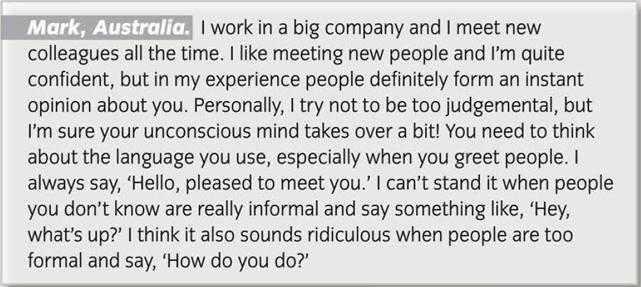
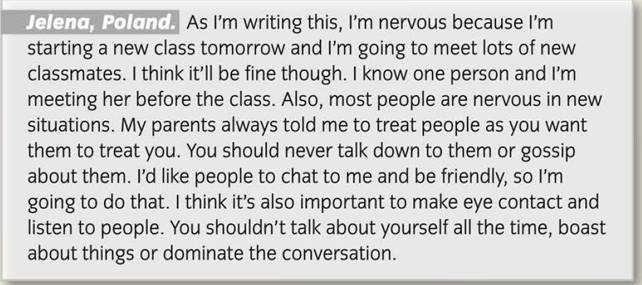
©Taken from New Total English Upper-Intermediate Student’s Book by
Araminta Grace with Richard Acklam, 2011, Pearson Longman, p.8
Handout 2
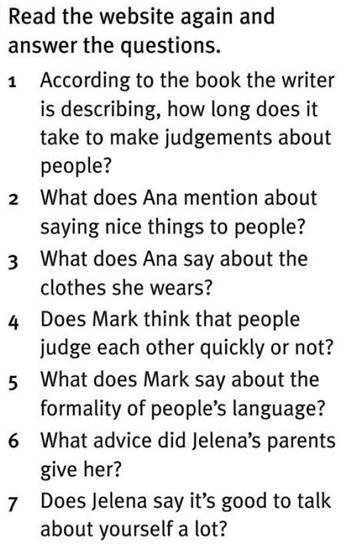 ___________________________________________
___________________________________________
___________________________________________
___________________________________________
___________________________________________
___________________________________________
___________________________________________ ___________________________________________
___________________________________________
___________________________________________
___________________________________________
___________________________________________
___________________________________________ ___________________________________________
___________________________________________
____________________________________________________________ __________________________________________________
__________________________________________________________
©Taken from New Total English Upper-Intermediate Student’s Book by Araminta Grace with Richard Acklam, 2011, Pearson Longman, p.8
Handout 3
|
|
Your |
Partner 1 |
Partner 2 |
|
|
|
|
©Adapted from New Total English Upper-Intermediate Student’s Book by Araminta Grace with Richard Acklam, 2011, Pearson Longman, p.8


про публікацію авторської розробки
Додати розробку

